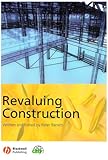| Title: | Revaluing Construction |
| Categories: | Construction |
| Authors: | Peter Barrett |
| ISBN-10(13): | 1405159197 |
| Publisher: | Wiley-Blackwell |
| Publication date: | 2007-10-18 |
| Number of pages: | 296 |
| Language: | English |
| Picture: |

|
| Review: |
Revaluing Construction addresses a pressing theme that has become a central subject matter for the various stakeholders making up the construction sector, namely, change. The effect of change often renders many of the tools, procedures, systems, and values that underpin the operational and strategic activities of every sector less relevant to their current circumstances, and hence, inadequate for achieving competitive advantage. To overcome the dampening effect of change on construction, a periodic re-evaluation of the raison detre for what the sector stands for, does and offers becomes an essential consideration for achieving future viability of its key stakeholders. In the past, the re-evaluation of the sector had been motivated by a national government interest in its quest to regulate construction and ensure that the sector can make optimum contributions directly and indirectly to national economic growth. Revaluing Construction provides such a focus on what construction does but with the following notable advantages. First, it is work conducted not at the behest of the national government, so it provides a more academic look at the problems the sector has to confront. This is very useful, because it ensures a focus on change drivers with a long term effect for construction instead of the immediate policy and commercial requirements required by the government of the day. Secondly, it embraces relevant developments of improvements, as well as change pressures from other parts of the world, including advanced, middle income as well as low-income economies. The fact that it is identifying common factors from the three economic bands which require attention makes the material in the book universally relevant to construction. Thirdly, it provides an additional coverage of the fundamental features that come together to shape the nature and characteristics of the sector. These departures give Revaluing Construction a relatively more objective stance on the issues that construction needs to address to improve on the value it generates in the face of current pressures for change. As such, the foundation laid by this volume would have to be re-visited from time to time as change imposes different demands on what and how construction can generate as value. But having such a foundation, is the most important and fundamental step towards such re-visitation. The book is aimed at the practitioner, especially, those involved in policy and strategy for the public sector as well as corporate establishments. Awareness of the issues addressed in Revaluing Construction should therefore, enable policy makers to create long term solutions that take on board the potential future changes that will take place in construction.. Equally, postgraduate and final year undergraduate students in construction and related programmes would find the material in the book very informative on the issues they would have to address in their career. The book is set out in four parts with the first part focusing on the need for change in construction. The argument espoused by the book that construction has been bombarded by several demands for change by the government of the day and gives the impression that the sector is unable to sustain internally driven innovation is well placed. The proposal for construction to adopt a perception and performance orientation to address innovation in order to ensure that improving value to the end-user becomes the norm and not an exception reflects the importance of the need for construction to break out of the vicious cycle of government driven improvement culture. Francis Edum-Fotwe Loughborough University |



